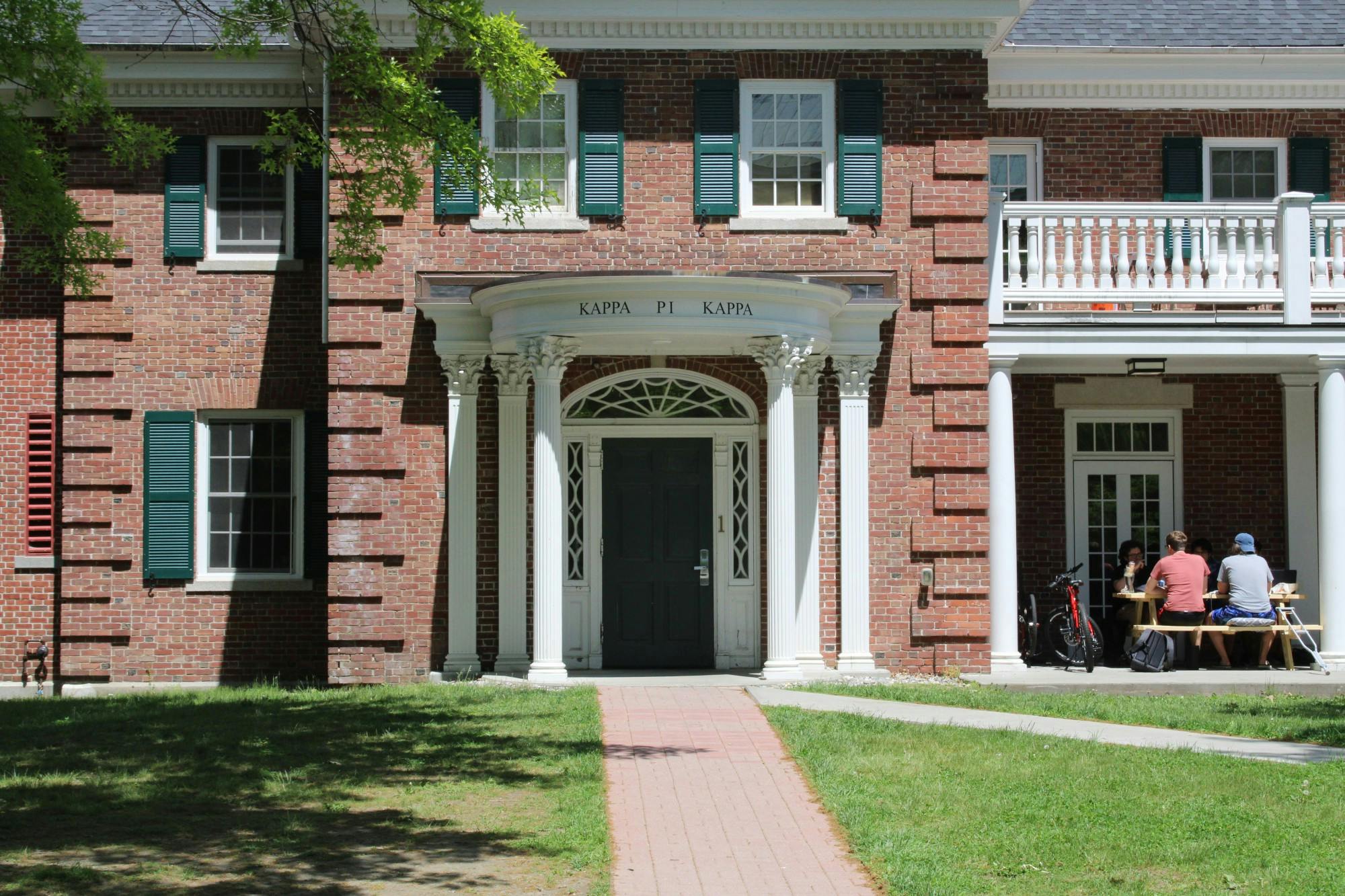Last week, the fraternity previously known as Kappa Kappa Kappa announced that it has changed its name to Kappa Pi Kappa. According to Kappa Pi Kappa vice president Ethan Lang ’23, 83% of the fraternity’s alumni and 88% of current fraternity undergraduates approved of the name Kappa Pi Kappa in a final survey sent to all fraternity members.
In an email sent to campus on May 19, the fraternity wrote that the chapter acknowledges the resemblance of the three “Kappas” of Tri-Kap to the three “Ks” of the Ku Klux Klan — a white supremacist organization founded 25 years after the fraternity — which “caused discomfort to members of the Brotherhood and to the Dartmouth community.”
“There’s less of a specific trigger right now [motivating the name change]. It’s more about … there was a resolution that this name didn’t necessarily align with our values, and it was time to rectify that,” former president Max Pumilia ’22 said. “I wouldn’t say there’s anything specific about this moment in time or these undergraduates — it was just sort of a final realization and push to amend that discrepancy.”
Pumilia said that the name change process began “in earnest” in the spring of 2021 when he became the chapter’s president. He added that the renaming process originated within the current undergraduate members of the chapter and eventually involved more than 1,000 alumni. Although Kappa Pi Kappa informed the Office of Greek Life of their plans to change the name of the organization, the chapter did not have to follow any requirements stipulated by the College, Pumilia said.
“Once we got into the more sort of technical, collaborative effort, making decisions that did involve the whole corpus of [Kappa Pi Kappa] members, including undergraduates and alumni, then it became a lot more [centered around] alumni engagement,” Pumilia said.
After obtaining the perspectives of current undergraduate members, Kappa Pi Kappa began fielding alumni perspectives. Lang said that Zoom town halls helped to facilitate communication with the larger brotherhood and “spurred development” on the name change process. According to Kappa Pi Kappa alumni councilor Bruce Danziger ’83, the fraternity’s corporation board “brought everyone together” to ensure group satisfaction with a final decision. Danziger said that most of the fraternity’s alumni agreed with the name change.
“The undergraduates clearly realized that you cannot have [the name Kappa Kappa Kappa]. It’s damaging to the house,” Danziger said. “You just can’t be associated with those letters for all the obvious reasons we know about.”
All Kappa Pi Kappa brothers who were interviewed said the potential renaming of the fraternity had been discussed for a “long” time. Lang said that the Kappa Pi Kappa Class of 2017 had entertained talks of a name change. Max Weintraub ’22 said that the earliest discussion of the matter he remembers was during the fall of 2019, when he first joined the fraternity.
Danziger said that he remembers hearing about an attempt at a name change in the 1990s, but that “it never really went anywhere, and there was a fair amount of opposition to it.” Danziger added he does not recall any discussions of a name change when he was an undergraduate.
While many students colloquially refer to most Greek organizations on campus by shortened monikers, the fraternity has not officially determined an informal name for itself, Weintraub said. Although Pumilia, Lang and Weintraub all referred to Kappa Pi Kappa as “Pi Kap” several times, Pumilia said that he wouldn’t be comfortable saying all other brothers have adopted that nickname for the fraternity.
“I think it’s a very easy transition — we used to be Tri-Kap, now we’re Pi Kap,” Lang said. “I’ve heard Kappa Pi used a few times, I’ve heard KPK… these things do change, but I think right now probably ‘Pi Kap’ is where we’re heading.”
Pumilla said that while obtaining brothers’ perspectives on the renaming of the fraternity was straightforward, the “infinite number of responses” on potential new names for the chapter required much more work, leadership and organization to manage.
“We chose a name that maintained our values and our history without retaining the obvious connection to the Ku Klux Klan,” Pumilia said.
Pumilia, Lang and Danziger all expressed their support for the name change.
“I’m just happy that the [new] name better reflects the values of the society,” Lang said. “Now that we are no longer held back by having these conversations about our name, I think we can better show campus who we are as a group.”
Weintraub initially did not want to change Tri-Kap’s name, citing the fact that Tri-Kap predates the KKK and his disbelief that anyone “in their right mind” would think that Tri-Kap was the KKK. However, he eventually came to support the name change and is “pretty happy with the outcome.”
“After seeing how much support [the name change] had among my brothers, and how passionately a lot of people felt about it, and the fact that it was overwhelmingly supported by almost everyone in the brotherhood, I agree with the decisions of my peers,” he said. “I joined the house because of the amazing brotherhood, and that’s really what matters, so that’s not going to change with the letters.”
Correction appended (May 27, 2022, 3:10 p.m.): A previous version of this article contained incorrect statistics provided by Lang on the percentage of alumni support for Kappa Pi Kappa's new name. After this article’s publication, Lang corrected the statistic. The article has been updated to reflect this correction.




